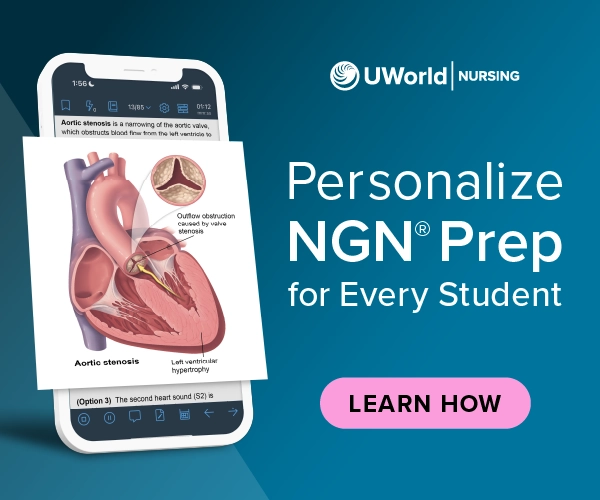Don’t panic.
It’s not easy to see your nursing students struggling halfway through a semester. A failed exam doesn’t have to be the end of their journey. In fact, exams offer an opportunity for a course correction that can set the stage for future success.
Step back and assess the reasons behind your nursing students’ poor performance. Once you do, you can work with them to create a tailored remediation plan that addresses gaps, strengthens skills, and rebuilds confidence.
This collaborative approach isn’t about salvaging grades. It’s about empowering students with the strategies and resilience they’ll carry into taking their NCLEX and beginning their nursing careers.
Begin With 1-on-1 Support: Data Analyses and a Personalized Remediation Plan
Starting with personalized support can make a substantial difference for students after a failed midterm. Schedule a one-on-one meeting to review the exam results, analyze study habits, and identify specific areas needing attention. Use this time to assess any challenges that may have affected their performance, such as test anxiety or time management.
Together, you can design a tailored remediation plan that addresses your students’ needs and equips them with improvement strategies.1 By providing focused support, you empower your students to actively engage in their own success.
Remediation: 5 Effective Strategies
A structured, targeted approach makes all the difference when helping your students get back on track. Let’s explore practical, structured ways to guide students to a stronger finish.
1. Correct Missed Questions With Written Explanations
Have your students revisit missed questions on their exam and write a brief explanation for each, detailing why the initial answer was incorrect and why the correct answer is appropriate. Using resources such as lecture notes and UWorld concept videos, students can dive into each question and clarify misunderstandings.
This exercise can help your students improve their exam scores and reinforce content comprehension. By articulating the reasoning behind correct answers, they engage more deeply with the material.2 This practice encourages active learning and supports student growth in mastering complex concepts.
Why is this important?: Explaining missed answers fosters accountability and critical thinking, allowing your students to learn from their mistakes. Instead of simply memorizing corrections, they internalize the content through active reflection. This method supports long-term retention and strengthens their ability to approach similar questions in future assessments. It also builds confidence by turning past errors into growth opportunities. Ultimately, this strategy equips students with skills for effective, reflective learning.
2. Use Data for Targeted Concept Reinforcement
Encourage your students to review data from their midterm to pinpoint concepts they struggled with, then assign targeted practice questions and NGN case studies from UWorld. This allows them to focus on high-need areas rather than revisiting material they already know. Using NCLEX-style questions enhances familiarity with test formats and analytical approaches.1 Supplementing these with UWorld’s concept videos and refined notes solidifies their grasp of challenging concepts. Students become better prepared to apply knowledge rather than simply memorize facts.
Why is this important?: Data-driven remediation hones students’ critical thinking skills by emphasizing areas needing improvement. By addressing specific weaknesses, students can feel more confident and directed in their study efforts. This method encourages a proactive, engaged approach to learning, which is crucial for clinical decision-making. Targeted reinforcement through NCLEX-style questions further enhances test readiness, helping your students progress toward licensure. Ultimately, this approach aligns practice with high-stakes exam demands, setting students up for future success.
3. Strengthen NCLEX Test-Taking Skills
Teach your students to carefully read each question, focusing on keywords such as “not” or “best,” and identify the main idea before reviewing answer choices. Introduce prioritization frameworks, such as ABC (airway, breathing, circulation), to help structure decision-making.2 Practicing with UWorld’s timed practice exams builds test-taking endurance and pacing skills, while elimination techniques help them strategically narrow down answers. Encourage them to trust initial instincts, only changing answers when they have clear justification. This skill set enhances their confidence and efficiency on exams.
Why is this important?: Strong test-taking strategies go beyond knowledge. They’re critical for minimizing errors and enhancing judgment. Familiarity with frameworks such as ABC improves exam performance and real-world application. Reducing test anxiety through practiced strategies increases accuracy and builds confidence under pressure. These techniques help your students proficiently manage content and the testing experience. By mastering these skills, students are better equipped for the NCLEX and clinical practice.
4. Address Testing Anxiety and Stress
In addition to strengthening endurance and pacing skills, encouraging your students to take UWorld’s NCLEX practice exams can help them acclimate to exam conditions and reduce anxiety. Teach relaxation techniques such as deep breathing, mindfulness, or visualization exercises to manage stress. Reinforce healthy habits, including regular physical activity, sleep, and balanced nutrition, to promote resilience. Peer study groups or mentoring can provide a supportive environment, alleviating the pressure of solo preparation. These resources empower students to face exam day with a clear, calm mindset.
Why is this important?: Managing anxiety is crucial to a student’s success, as high stress can disrupt focus and memory recall.3 Familiarity with the exam format helps reduce fear of the unknown, allowing students to concentrate better on the material. Relaxation techniques provide tools for calming the nervous system, which boosts performance. Encouraging balanced self-care supports mental and physical well-being, which is essential for tackling high-stakes exams. By addressing anxiety, your students can achieve clearer focus and greater confidence.
5. Provide Continuous Feedback and Support
Using UWorld’s reporting features, monitor each student’s progress with their remediation plan and hold regular check-ins to adjust strategies as needed. Encourage students to use data reports to self-assess and stay accountable. Schedule 1-on-1 meetings for additional guidance or to celebrate milestones, helping them feel supported and motivated. Promote a mindset of continuous growth, reminding your students that progress, even if gradual, is valuable. This feedback loop fosters a positive, encouraging learning environment.
Why is this important?: Ongoing feedback keeps your students engaged, helping them feel seen and supported as they work through challenges. Regular check-ins offer accountability and encourage students to reflect on their progress, enhancing self-directed learning. This approach strengthens critical thinking and builds resilience, which are vital skills for the NCLEX and clinical practice. Providing consistent support boosts confidence, reinforcing that growth is a continual journey. By fostering a culture of encouragement, educators contribute to academic and professional development.
References
- Body Interact. (n.d.). Remediation in nursing: How to address skill and knowledge gaps. Body Interact. https://bodyinteract.com/blog/remediation-nursing/
- ATI Testing. (2022, November 2). The importance of remediation in nursing education: Evidence and insights from research. https://www.atitesting.com/educator/blog/knowledge/2022/11/02/nursing-remediation-research
- UWorld Nursing. (n.d.). Next-gen NCLEX remediation strategies for nurse educators. UWorld Nursing. https://nursing.uworld.com/blog/next-gen-nclex-remediation-strategies-for-nurse-educators/
- Davis & Elkins College. (n.d.). Nursing program recognized for excellence in remediation efforts. https://www.dewv.edu/12489-2/
- Broussard, L., & White, J. (2021). Using simulation to teach clinical judgment and remediate at-risk nursing students: A qualitative study. Journal of Nursing Education, 60(5), 252-258. https://doi.org/10.3928/01484834-20210420-08
- Kelley, A., & Inouye, J. (2023). Improving remediation effectiveness for nursing students through assessment-driven strategies. Journal of Nursing Education and Practice, 13(1), 20-25. https://doi.org/10.5430/jnep.v13n1p20
- Kirkpatrick, A. (2023, March). Applying Kirkpatrick’s model for effective nursing remediation. American Association of Colleges of Nursing Conference. American Association of Colleges of Nursing. https://www.aacnnursing.org/Portals/0/PDFs/Conferences-Webinars/Presentations/2023/Kirkpatrick_Amanda.pdf
- Collaborative Momentum Consulting. (2024, April 10). Effective remediation for nursing students: Strategies for success. Collaborative Momentum. https://collaborativemomentum.com/2024/04/10/effective-remediation-for-nursing-students/









